Earlier this month, Advance CTE released a Credit for Prior Learning Messaging Toolkit in partnership with Education Strategy Group and the New Skills ready network. This toolkit provides guidance and templates to help state leaders develop key messages that engage and communicate the value and use of Credit for Prior Learning (CPL) to adult learners, postsecondary faculty and staff and employers.
 This post interviews Community College of Vermont’s Director of Prior Learning Assessment, Melissa DeBlois for insights on the need for this resource and how communicating CPL is realized at the institution and learner level.
This post interviews Community College of Vermont’s Director of Prior Learning Assessment, Melissa DeBlois for insights on the need for this resource and how communicating CPL is realized at the institution and learner level.
In our conversation, Melissa shared how CCV’s simple, yet effective strategies have been deployed to empower and support adult learners in returning to the classroom to complete their degrees.
When and why was the Office of Prior Learning Assessment established?
The Office of Prior Learning Assessment was established in 1975 in response to the need for a formalized process that would reconnect adult learners by awarding postsecondary credits for previous academic or work-based experiences.
Who do you consider to be your core audience for communications regarding Prior Learning Assessment / Credit for Prior Learning (PLA/CPL)?
Our primary audiences are students and employers. We find that students aged 25 and up and those with military connections are particularly successful in PLA/CPL because they often already have some learning that could be documented through the PLA/CPL process.
While employers are eager for resources to help upskill their employees, I’ve also had senior leadership approach me after leading a session to ask about whether PLA could help them complete their degrees. We foster a culture where these tools and resources are open and available without shame or judgment for anyone to take advantage of.
Which communication strategies would you consider to be exceptionally high-impact?
Social media and digital marketing are huge for us. Our marketing department utilizes data to determine which platforms have the greatest impact to get information in front of our audiences. We developed some short, pathway-specific videos that feature stories of program alumni. Sharing personal perspectives has been incredibly effective for connecting with our adult population as they are able to see themselves in these campaigns and it encourages them to dream about where they could go with their learning.
Our admissions department sends automatic messages to everyone who applies. Our software has the capability to send texts and emails, but our method depends entirely on the contact information that the learner has provided to us. On the day they apply, they receive a message from me asking if they have an interest in saving time and money on their path to a degree, and it has been a pretty effective way to target folks.
Webinars have also been effective communication tools for reaching our audiences. Now that people are more familiar with Zoom, they have the opportunity to access this information in a way that they weren’t able to before.
Are strategies differentiated based on the PLA program/initiative or target audience?
In December 2020, we developed new competency-based PLA options specific to early childhood education. We were able to generate a mailing list of all registered childcare centers in the state and sent out informational fliers and contact cards to post in their break rooms. While this approach was low-tech, it specifically catered to the individuals working at the center by placing our fliers on staff bulletin boards in break rooms or common spaces they’d be seen every day.
How have your strategies changed over time?
We collect data from those who enroll and those who attend our informational sessions. We ask them about their takeaways from the session to better understand what the most relevant pieces of information were for them. I find that there are a lot more folks who are interested in learning a little bit more before they’re actually ready to devote the time and energy to enroll in courses. We’ve seen that they are exploring well in advance, and it can often take them months or sometimes years to follow through while they make arrangements to fit college into their already full lives.
Were there additional surprises or pushback to this program that your team wasn’t anticipating? If so, how did you mitigate these?
PLA is complicated, and I’ve seen students struggle when they try to navigate it on their own. Our adult learners do not want to be on hold, but being short-staffed means that our capacity to serve learners is a challenge. This population doesn’t want to be bounced around from office to office. They want to talk to one person to help them figure out what they need to do and get started. We’ve addressed this by prioritizing in-person sessions where I can interact in real-time and answer their questions. We wrote PLA into CCV’s strategic plan, so expanding opportunities for our adult learners are included in all of our goal-setting as it’s part of the DNA of our institution.
Another challenge in PLA/CPL is the acceptance and transferability of credits. I’m hopeful that more institutions will be open to prior learning assessed credit because they need to in order to stay afloat. They need to recognize that adult learners come with experiential learning with a college credit value, and I think we’re moving in that direction.
Finally, as a community college, we don’t have a lot of funding available so we need to get creative about how to fund these initiatives, not on the backs of tuition dollars for our students.
What recommendations do you have for other states seeking to increase engagement and improve communication around CPL?
I have three pieces of advice:
- Profile your successful students. It is important for students to be able to see themselves in this process.
- Be patient with the process. Adult learners need time before they’re ready to approach PLA/CPL with an open mind and trust that they can find success through this process.
- Find your champions. Whether it’s students, faculty or employers. Word of mouth is pretty powerful in this process. We can do all the videos and profiles and all that kind of stuff, yet I still hear from students who actually enroll that they say they were referred by a friend.
What is the future of credit for prior learning in Vermont?
We’ve seen a lot of promise in competency-based pathways. We’ve broken down courses into modularized content that will allow folks to test out and complete assignments on their own without having to sit through an entire class. The response has been positive, and we’ve developed 12 competency-based pathways that are very popular for meeting the needs of learners at all kinds of places in their career paths.
Visit Advance CTE’s Learning that Works Research Center for additional resources about credit for prior learning, including the Embedding Credit for Prior Learning in Career Pathways Policy Benchmark Tool and the newly released Credit for Prior Learning Messaging Toolkit.
Amy Hodge, Policy Associate
Melissa DeBlois is the director of the Office of Prior Learning Assessment and a member of the Prior Learning Assessment Network. In her role, Melissa coordinates and provides outreach efforts, hires faculty for portfolio reviews, course challenges, and ETES program reviews, trains faculty to teach portfolio courses, provides information to a variety of audiences via presentations, documentation, videos and webinars, and facilitates portfolio reviews. She spent the first 18 years of her career at the Community College of Vermont. Before working in prior learning assessment, she was a coordinator of academic services for the CCV-Burlington, then CCV-Winooski, academic teams. She has reviewed and developed computer degree programs on the Technology Curriculum Committee for the last 15 years. Melissa holds a bachelor of arts from St. Lawrence University and a master of education with a focus in technology integration from St. Michael’s College.
 Kyllie discovered her passion for CTE in the classroom as a culinary instructor of 15 years and fondly recalls seeing her high school learners’ “faces [light up] when they made something” as they gained valuable skills in her classes. “Some [learners] hadn’t even washed a dish before.”
Kyllie discovered her passion for CTE in the classroom as a culinary instructor of 15 years and fondly recalls seeing her high school learners’ “faces [light up] when they made something” as they gained valuable skills in her classes. “Some [learners] hadn’t even washed a dish before.”

 As a lifelong educator, Brent Haken, who began his role as the new State CTE Director of Oklahoma CareerTech in January 2023, has a deeply rooted passion for Career Technical Education (CTE).
As a lifelong educator, Brent Haken, who began his role as the new State CTE Director of Oklahoma CareerTech in January 2023, has a deeply rooted passion for Career Technical Education (CTE). This post interviews Community College of Vermont’s Director of Prior Learning Assessment, Melissa DeBlois for insights on the need for this resource and how communicating CPL is realized at the institution and learner level.
This post interviews Community College of Vermont’s Director of Prior Learning Assessment, Melissa DeBlois for insights on the need for this resource and how communicating CPL is realized at the institution and learner level. Beth Hargis was named the Kentucky Department of Education’s Associate Commissioner in the Office of Career and Technical Education and State CTE Director last year. In Kentucky, Career Technical Education (CTE) is housed in the Kentucky Department of Education, where the Office oversees middle grades and secondary CTE, youth and registered apprenticeships and the area technical center system.
Beth Hargis was named the Kentucky Department of Education’s Associate Commissioner in the Office of Career and Technical Education and State CTE Director last year. In Kentucky, Career Technical Education (CTE) is housed in the Kentucky Department of Education, where the Office oversees middle grades and secondary CTE, youth and registered apprenticeships and the area technical center system. Hello! I am extremely excited to have recently joined Advance CTE as a Senior Policy Associate. I will be supporting Advance CTE’s state policy team in a variety of programs including the National Career Clusters Framework®, Launch: Equitable & Accelerated Pathways for All and the Equity Strategy Project. My journey to Advance CTE has been a bit of a winding one and it has only strengthened my belief in the value and importance of Career Technical Education (CTE).
Hello! I am extremely excited to have recently joined Advance CTE as a Senior Policy Associate. I will be supporting Advance CTE’s state policy team in a variety of programs including the National Career Clusters Framework®, Launch: Equitable & Accelerated Pathways for All and the Equity Strategy Project. My journey to Advance CTE has been a bit of a winding one and it has only strengthened my belief in the value and importance of Career Technical Education (CTE).  Hello, I’m delighted to be joining Advance CTE as a Senior Advisor where I’ll be leading the strategy, design and delivery of technical assistance to support states and serving as a coach for state teams. I live in the Boston, Massachusetts area. I’m committed to educational equity and passionate about preparing all students for success in school, college, career and life.
Hello, I’m delighted to be joining Advance CTE as a Senior Advisor where I’ll be leading the strategy, design and delivery of technical assistance to support states and serving as a coach for state teams. I live in the Boston, Massachusetts area. I’m committed to educational equity and passionate about preparing all students for success in school, college, career and life. Developing environmental literacy in elementary, middle and high school is essential to prepare learners for an evolving economy and to equip them with the skills and experiences they need to tackle urgent environmental challenges, both globally and in their own communities. By 2030, it is estimated that 24 million green jobs will be created in industries ranging from energy to finance and transportation.
Developing environmental literacy in elementary, middle and high school is essential to prepare learners for an evolving economy and to equip them with the skills and experiences they need to tackle urgent environmental challenges, both globally and in their own communities. By 2030, it is estimated that 24 million green jobs will be created in industries ranging from energy to finance and transportation.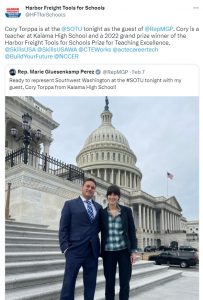 Just two weeks later, First Lady Jill Biden’s guests for the State of the Union (SOTU) address included Kate Foley– a 10th-grade computer-integrated manufacturing student who the First Lady had met last year during a visit to CTE programs in Rolling Meadows High School. In addition, Rep. Glusenkamp Perez (D-WA) brought Cory Toppa, a construction, engineering design, and manufacturing teacher at Kalama High School and the director of CTE for the Kalama school district.
Just two weeks later, First Lady Jill Biden’s guests for the State of the Union (SOTU) address included Kate Foley– a 10th-grade computer-integrated manufacturing student who the First Lady had met last year during a visit to CTE programs in Rolling Meadows High School. In addition, Rep. Glusenkamp Perez (D-WA) brought Cory Toppa, a construction, engineering design, and manufacturing teacher at Kalama High School and the director of CTE for the Kalama school district. 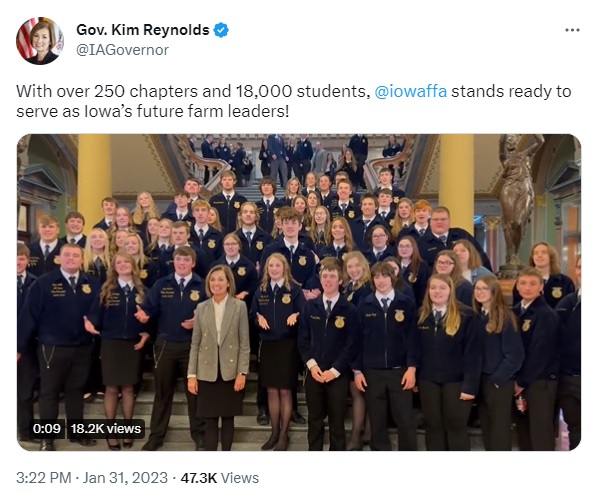
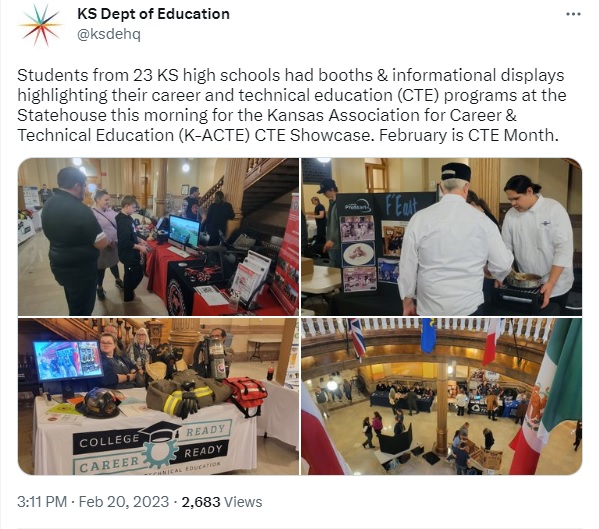
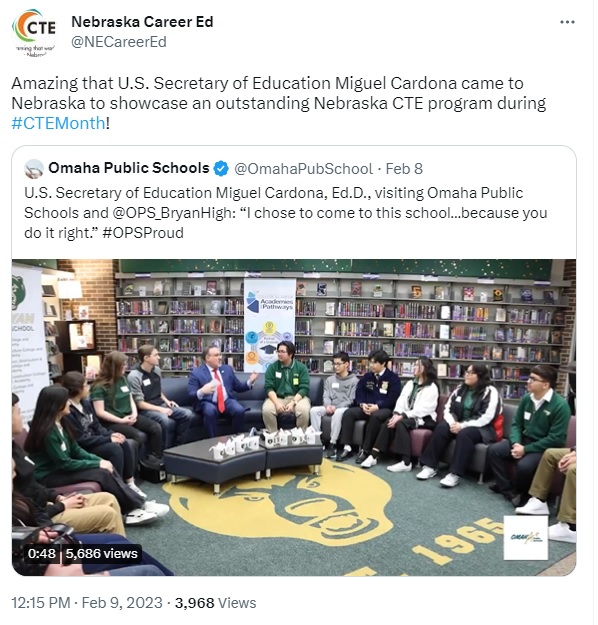
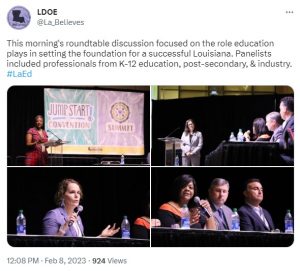
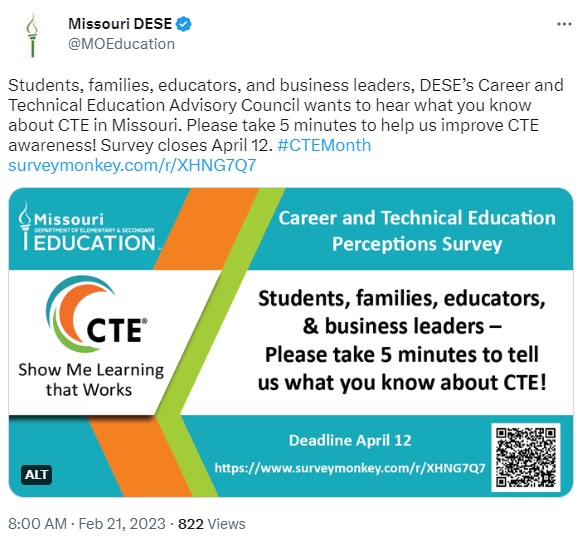
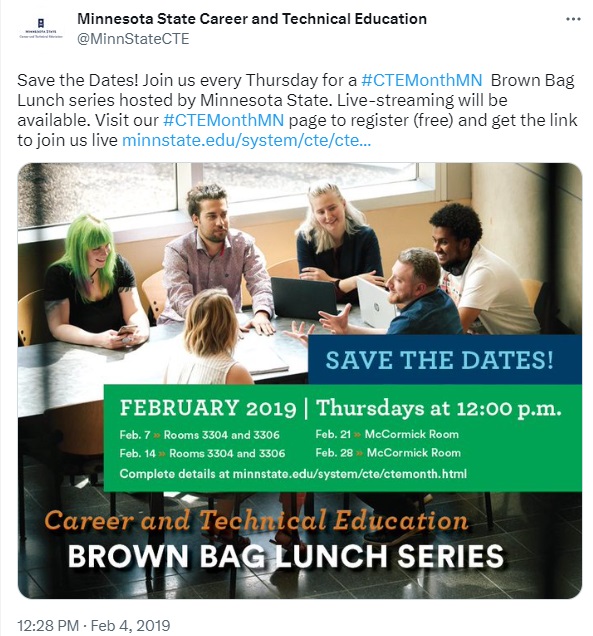
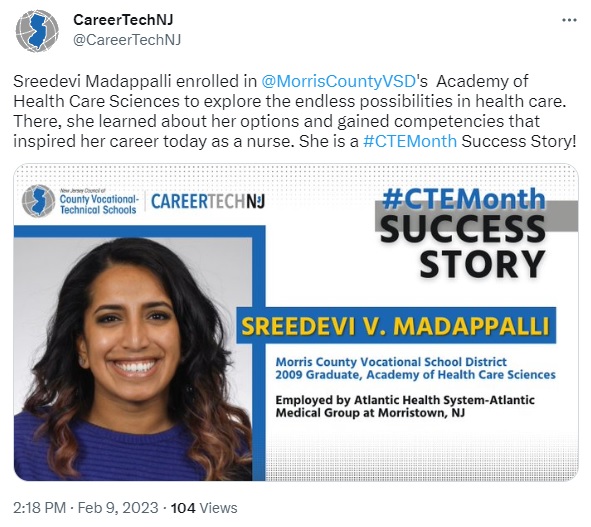
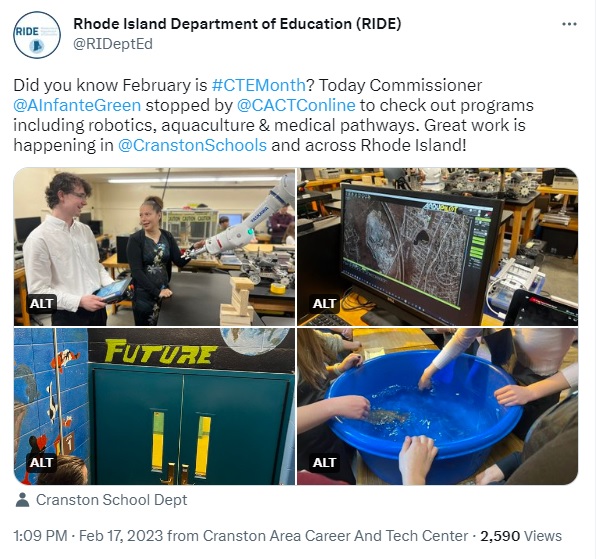

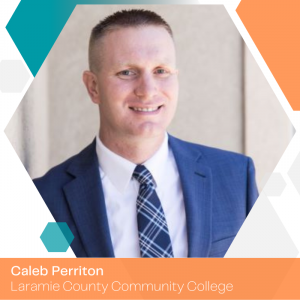 Caleb Perriton’s career began in the automotive industry as an international trainer prior to entering the world of postsecondary CTE. Currently, he serves as Program Director of the Trades & Technical Studies Pathway at Laramie County Community College. He is an ASE Certified Master Automotive Technician and earned a bachelor’s degree in automotive technology from Weber State University and master’s degree in business administration from the University of Wyoming.
Caleb Perriton’s career began in the automotive industry as an international trainer prior to entering the world of postsecondary CTE. Currently, he serves as Program Director of the Trades & Technical Studies Pathway at Laramie County Community College. He is an ASE Certified Master Automotive Technician and earned a bachelor’s degree in automotive technology from Weber State University and master’s degree in business administration from the University of Wyoming.  Dr. Luv’Tesha Robertson
Dr. Luv’Tesha Robertson 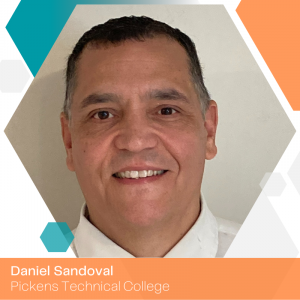 Daniel Sandoval is passionate about cultivating self-reliance among learners and students from marginalized populations and has focused on serving immigrant, economically disadvantaged, racially underrepresented and linguistically diverse communities. His range of experience includes grant writing and administration, managing apprenticeship and credential attainment initiatives, and serving in leadership roles in postsecondary student services. Currently, Sandoval serves as the Director of Customized Training and Apprenticeships at Pickens Technical College and as a Psychology instructor at the Community College of Aurora. He earned a bachelor’s degree in English writing from Colorado Mesa University and a master’s degree in counseling psychology from the University of Colorado at Denver.
Daniel Sandoval is passionate about cultivating self-reliance among learners and students from marginalized populations and has focused on serving immigrant, economically disadvantaged, racially underrepresented and linguistically diverse communities. His range of experience includes grant writing and administration, managing apprenticeship and credential attainment initiatives, and serving in leadership roles in postsecondary student services. Currently, Sandoval serves as the Director of Customized Training and Apprenticeships at Pickens Technical College and as a Psychology instructor at the Community College of Aurora. He earned a bachelor’s degree in English writing from Colorado Mesa University and a master’s degree in counseling psychology from the University of Colorado at Denver.